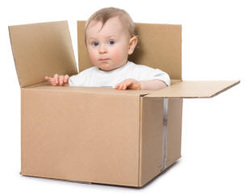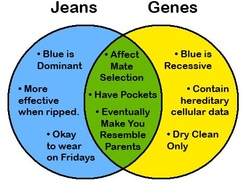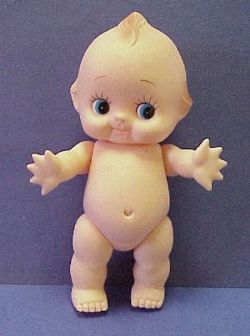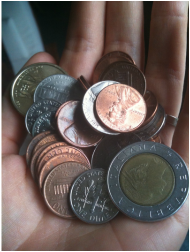 First, let me be clear: babies are birthed and pizza is delivered. Now that THAT is out of the way... step into my time machine as I bestow upon you the wonders of grocery delivery. Imagine a weekly (or bi-weekly) box of fresh produce and pantry items that arrives at your doorstep. Imagine that it contains only things you like. Imagine that it costs the same as a trip to the grocery store. Good news for you! My time machine is just a figment of my imagination. The beauty of doorstep groceries is a modern convenience, and it is perfect for new mamas and those on bedrest. Some things are more fun with babies, like bath time and navel gazing. Some things are a little more challenging, like loading up groceries, figuring out who to carry in first (baby or ice cream), and grocery carts (in general). While I'm a HUGE proponent of getting outside of your own house once a day once you're healed, I'm not sure grocery shopping will be the blissful experience it once was. Here are my favorite delivery services: Door to Door Organics (Colorado and a few other states) - Set your "likes" and "dislikes" so you never end up with parsley unless you want to. - Order weekly or bi-weekly and forget about it. - Log on a week before and "customize" your fruit and/or veggie box with items that you need or want; add any pantry items or dairy/meat etc. - Hold, cancel, or change box sizes any time (no fee). - Affordable at $25 for a bitty box and up. - Easy refunds on any damaged or icky produce (this has happened to me only twice in two years). Walgreens - Routine prescriptions are mailed to your home with no additional charge (but you need to set them up at least two weeks in advance). - All sorts of toiletries and other things you might need. - Schedule regular deliveries if you know you'll need shampoo or tissues every so often. - Shopping list feature allows you to bookmark items you buy frequently so you (or your partner) don't have to snoop around the internet for the right shampoo. - Free shipping on most orders and regular discounts via email. Nature Box - A combination of healthy snacks mailed once a month. - After your first box, you can customize and include allergies/preferences. - Just like a road trip, where you want the snacks everyone else brought? In a box. Amazon - Nuts, pasta, toilet paper, birthday gifts... whatever else you could possibly need can probably be ordered via Amazon. - Wish list keeps items you like in an easy place. - Recurring orders will save you a bit, if you have a dried coconut habit like I do. Take your trips out of the house to visit the library, a coffee shop, or the zoo and leave the shopping to the Internet. At 2am. Or whenever you are most shoppy! I don't get any kickbacks from these companies, but I've noticed many mamas who have really appreciated the support of these online and delivery services.
1 Comment
 I'm an expert list-maker. If you are the list-making type, you may notice that your pregnancy has pushed you into overdrive. Never made a list in your life? This is a great time to learn how to manage one or two. Everyone is, or will be soon, asking you about where you are registered for baby items. You may have no clue what you really need, and might therefore default to the list the store gives you, what your mom/best friend says, or worse (in my humble opinion)anything you can train your scan gun onto. I've addressed the bare-bones pre-baby list in my Registry List, so you know what I think you need. Before you panic, remember the two things you must have before baby is born are boobs and a carseat. If you're currently pregnant, you're halfway there. But for number three, I recommend a couple of ways to get what you need and not much that you don't. 1. Poll your friends. Not the friends you wish you were like, or the friends who have twice as much disposable income as you do, but the friends you think you might be most like as a parent. Ask them what they use most, enjoy most, wish they had received. 2. Find out why they like it. Maybe you've forgotten that you bought them an infant xylophone in a half-hearted attempt to fulfill a registry request but they remember. The reason might be relevant to you, or it might not. Diapers might be gender specific. Strollers are car, carseat, activity, and region-specific. 3. Ask them what they never use/thought they would use/have extra of. Most of the new mamas I encounter are thrilled to purge anything they aren't using. There are truly only so many swaddling blankets that one baby can use, and some babies might use pacifiers while others never take to them. 4. Forget the big-box registry. I know this is sacrilegious, because you don't have the opportunity to use the scan-gun. But I will bet you that the items your friends recommend will not come exclusively from one or two stores. Do you want to lock your family into shopping at one large retailer? Or would you like a few unique items from local stores? There may be other sites like this, but I've heard great things aboutmyregistry.com. You can register for items found anywhere online, and your friends and family can find the item that suits them best. This list can absolutely be your new BFF. Loving lists? Check out my meal-sharing tip sheet and my A/B Listfor postpartum job delegation. More registry suggestions....  Thanks to Kidsguide UK for the photo. Disclaimer: I have no babies, and I've never registered for baby goodies. I have, however, taught lots of classes with women who have both registered and received/not received things they needed... and I've heard enough to share their wisdom with you. Think Local: If you register with a big box store and have any issues with your gifts, returns, broken items, and more, you are sent through a tireless loop of FAQs, menus, and hold songs. If you register with a smaller store in your home town and get to know the people who work there, they will offer you free advice, work with you for exchanges, and recommend products that you and your baby will actually need and use (rather than issuing you a generic list and a scan-gun). When I ask women what they would have done differently, they all say they wouldn't register with one particular big box store because it was impossible to get what they wanted, return what they didn't, and even have items shipped as expected. Less is More (space, money, time): You might be the kind of family that thinks you'd like a pacifier on every end table, but your baby might not take a pacifier. If you register for fifteen of them at the suggestion of a valued friend and you baby never uses them, that's quite a bit of wasted plastic, time, and gift-wrap. Crib skirts are super cute, but are crib legs really that ugly? Think about what you might actually use in the first few weeks and then head out once baby arrives and buy whatever you're missing. Think Quality (of life, that is): Unless you are tickled to have your mother, sister, mother in law, or BFF move in with you, consider asking your friends to contribute towards hiring a postpartum doula. The $500 you spend is worth all the cheap onesies, receiving blankets, toys, and wipe warmers in the world. Follow your Values: If you recycle your cans and jars and consolidate car trips to save a little wear and tear on the Ol' Mother Earth, consider what you can reuse. Cloth diapering a baby costs several thousand dollars less per year than using disposables. It also doesn't smell nearly as bad and you never have to do a midnight run to the drug store through a snow storm to buy replacements. Cribs and high chairs are more likely to be improved from year to year, but if you have a friend whose child is soon moving out of theirs, you can check model numbers online and confirm that no recalls have been issued for the product. Keep It Simple, Sally: Here is the short list of things you actually need before the baby arrives: 1. Boobs 2. Carseat My guess is that if you're pregnant, you're halfway done. If you're pinching your pennies, get a carseat as soon as you can and get it installed (they don't let you leave the hospital without one). What, you wanted a real list? My basic list is here, free for you to download. Enjoy!  Borrowed from http://runningahospital.blogspot.com Every time I do anything even remotely ingenious, dorky, or with the aid of a list, my father says, "Genes work!" When I was younger, I was embarrassed by this, thinking that the comment was heavy on the "dorky" and light on the "ingenious" because my father shares my penchant for self-deprication. But as I've grown up a bit more, I realize that he's saying this as a compliment. He's proud of his achievement. Biologically, scientifically speaking, we are a legitimate species if we can produce reproductively viable offspring. In plain-speak: we all want to be grandparents. I think this goes beyond weekends at grammy's, cookies and fishing. In fact, I think it goes far beyond biology. While my father takes pride in passing along my genetic code, including my Lithuanian green eyes and my exceptionally long monkey toes, I believe that the true source of his pride lies in the things he taught me both explicitly (the genius of list-making and preparedness) and accidentally (geek-speak). Although he always threatens to write a memoir, my father isn't a big writer. He's a story teller. As am I (and I'm equally terrified to write anything actually significant). Perhaps what scares me most about possibly becoming a parent, is the fact that I'll be sharing not only what I hope to share with my children (my world-class packing skills), but what I might inadvertently share (my irrational fears of news media, basketball, cats, and the body scan at the airport). I believe that children pick and choose the best parts of their parents and other adults and emulate what they can. I also know that some darkness transfer is unavoidable. But I believe it is our duty to our species and our planet to leave things better than we found them. To weed through the muck and hand over a slightly better version of ourselves to the next generation. Prepare to be an AWESOME Grandma/pa: 1. Identify the habits that you are least interested in sharing with your offspring. Perhaps there is some disordered eating behavior in your past or a love of slot machines. Consider getting professional help managing these issues, rather than hoping you will hide them from your children. Remember when your parents tried to hide things from you? Exactly. It doesn't work. 2. Get rid of the things you don't want your children to find. Perhaps there are some juicy love letters that you'd rather not share with your 13 year old. Get a safety deposit box or off site storage unit now. 3. Tidy your relationships with your partner, parents, siblings, and neighbors. Unless you want your toddler to call the crotchety neighbor "Mr. S#its," as you have, clean it up now. 4. Cultivate your quirks. Aside from their teen years, when they are most likely to harbor intergalactic parasites, your child has the potential to love even the weirdest things you do and consider them normal. Do you remember going to junior high and realizing that no one else had parents who wrote the date on everything coming into the house? Do you remember how normal your parents' behavior seemed to you? 5. Open yourself up to new ideas and foster a willingness to let your children change you. As a family, you'll get to create new norms and values.  What my baby looked like, except she had pants. I was so excited when my parents came home from this hospital with my new baby brother (I was five years old and had had a baby of my own for years at that point, and thought it was about time my mom had one, too). As soon as he got home, I tried to share my expertise in baby handling, but was frequently informed that I was "too small" to hold the baby or that the baby was "too big" for me to carry around. After a few weeks, this became rather tiresome. While my parents made a concerted effort to keep me in the loop, I remember feeling sad that I now had to share my adoring audience with a baby who, unlike my baby, cried, pooped, and did not go into the bath with me. Two particular memories bring me back to this trying time: The Apocalyptic Meltdown: Immediately after his baptism, we opened the family home to (what felt like) three thousand of our closest friends. They all introduced themselves to me and immediately asked "How do you like your new baby brother?" I was a mostly polite child, and I liked when people talked with me, so I was kind and generous for the first 1,500 visitors. But the turning point came about an hour into the party (and before cake, if there was any cake) when I announced to the room that, "If one more person asks me how I like my new baby brother I'm going to my room and never coming out." You know how this ends. The Great Escape: A few weeks later, my mother on her last nerve and I on mine, I decided to illustrate my maturity and acrobatic strength and agility by scaling my brother's crib, removing him, and carrying him about 100 feet around the house and into the kitchen. When my mother tells this story, she says I "... missed hitting his head on the edge of the kitchen doorway by an eighth of an inch." In all fairness, everyone was right. I was a very small five year old, and he was a BIG baby. But no one anticipated the sheer force of my will. Tips for Keeping the Big Sibling from Absconding with the Baby Use your words. Tell the big sibling about how things will change with the new baby. This implies that you have a plan, which you should (separate post to follow about this). Prepare your friends. Encourage (or demand that) your friends and relatives greet the older child first when they come to see the baby. They don't need to bring a toy for the older child, but suggest that they plan to spend five minutes with the older sibling and then either have the older child introduce them to the baby, or have them break the conversation and move along. You're also training your older child to be great at cocktail parties! Practice with a puppy. (don't actually get a new puppy in the same year that you are welcoming a new baby into the house) Find a friend who has a newer baby animal that you can go and visit with your older child. Practice sitting quietly, perhaps on an adult's lap, and learning how to hold and be gentle with the puppy. This sets the stage for how you will later allow the older child to hold the baby (on an adult's lap, being gentle). Schedule special time. Baby gets lots of attention, particularly in the first six weeks. If you can utilize the services of a postpartum doula to give mom respite, then she can have special time with the older child. Same is true for her partner. Also be sure to schedule baby holding time if the child wants to hold the baby. Stock up on bribes. I don't recommend rewarding anyone with food, but this is a good time to bring in some special new toys or books for the older child. Regardless of the older child's gender, you might introduce a baby doll with all of the fixin's like diapers, bottles, nap blankets, and changes of clothes. If you are looking for other toys, I recommend those that make no noise, require no batteries, and are easy to enjoy alone. Building toys, puzzles, books, and art supplies are great options.  A little-known fact about me? I'm not a huge fan of baby showers. I know, I teach prenatal yoga. Yes, I get invited to a lot of baby showers. And yes, I go. But while everyone else is cooing over the frilly clothes or decorative wall hangings, I'm thinking about baby's future. You see, in a previous life I worked in college admissions. I've spoken with thousands of families who wondered where they would get the money to send their teenager to college. Some opted to take out a plus loan, or a second mortgage on their house. Others hoped that athletic talents would win their student a free or discounted education. A handful (truly, a small handful) knew with great confidence that their student would have access to whichever education they wanted because they had been saving for it from the beginning. I'm not talking about the independently wealthy, but families with modest incomes, like teachers, nurses, and public servants, who had socked money away starting when their child was born. Maybe you're not a saver, or don't know much about how money works in this world. But this is an amazing opportunity to learn and to take advantage of the many different ways you can start funding your baby's education starting now. For some people, a 529 plan is the right choice. For others, a Coverdell Education Savings Plan. There are many options you should discuss with your partner and possibly a financial advisor. Even a simple savings account in your child's name is better than nothing, because it will get you saving. Tips for Saving for Baby 1. Include a college fund on your registry. Let shower attendees know that you'll have a container to receive cash gifts that will go towards baby's future education costs. Let attendees know that they will have the opportunity to take pride when baby goes to school, rather than just when they see the crib skirt they purchased. 2. Commit to an annual contribution to baby's account as a gift from you or you and your partner. Invite grandparents and others to contribute as well. A smaller toy/book gift will be just as meaningful (kids usually prefer playing with the box anyway). 3. Learn more about how money works. It's a shame so many Americans graduate from high school with almost no understanding of how to save, spend, invest, and how to manage debt. Make sure YOU teach your baby the ways of the financial world. 4. Avoid the Curse of the Trustafarian. A lot of children who enter college with a savings account feel entitled to spend it however they choose (usually on beer). Regardless of the size of the account, strongly consider having the child take out a student loan in her name. This will keep her accountable for her own education, encourage her to pursue her passions (rather than taking the classes she thinks you want her to take), and encourage her to use all of those financial lessons you taught her over the years. |
About meI'm one of those people who loves making your life easier (and I believe in you). I am an experienced registered prenatal yoga teacher and a lactation educator. Want more? My monthly newsletter might be for you.
Archives
April 2014
Categories
All
|
 RSS Feed
RSS Feed
